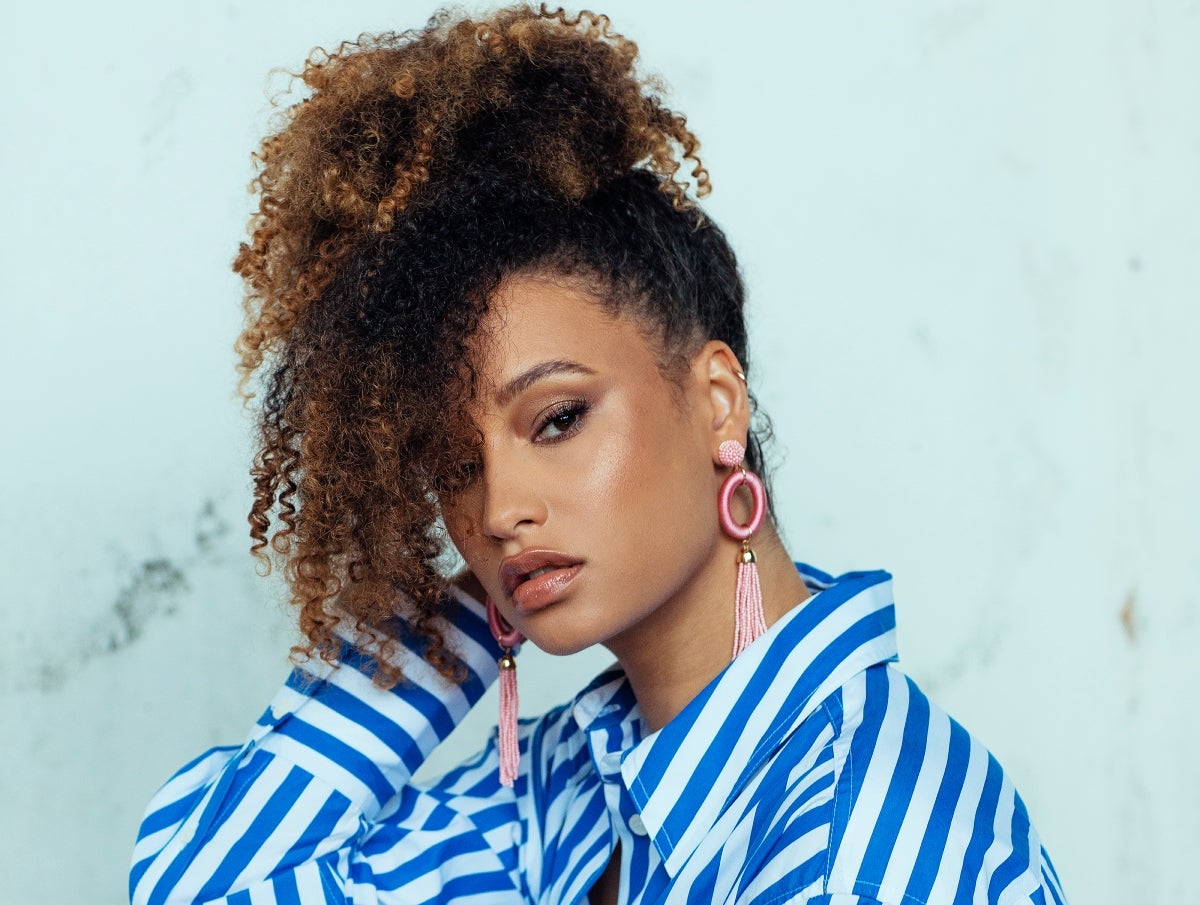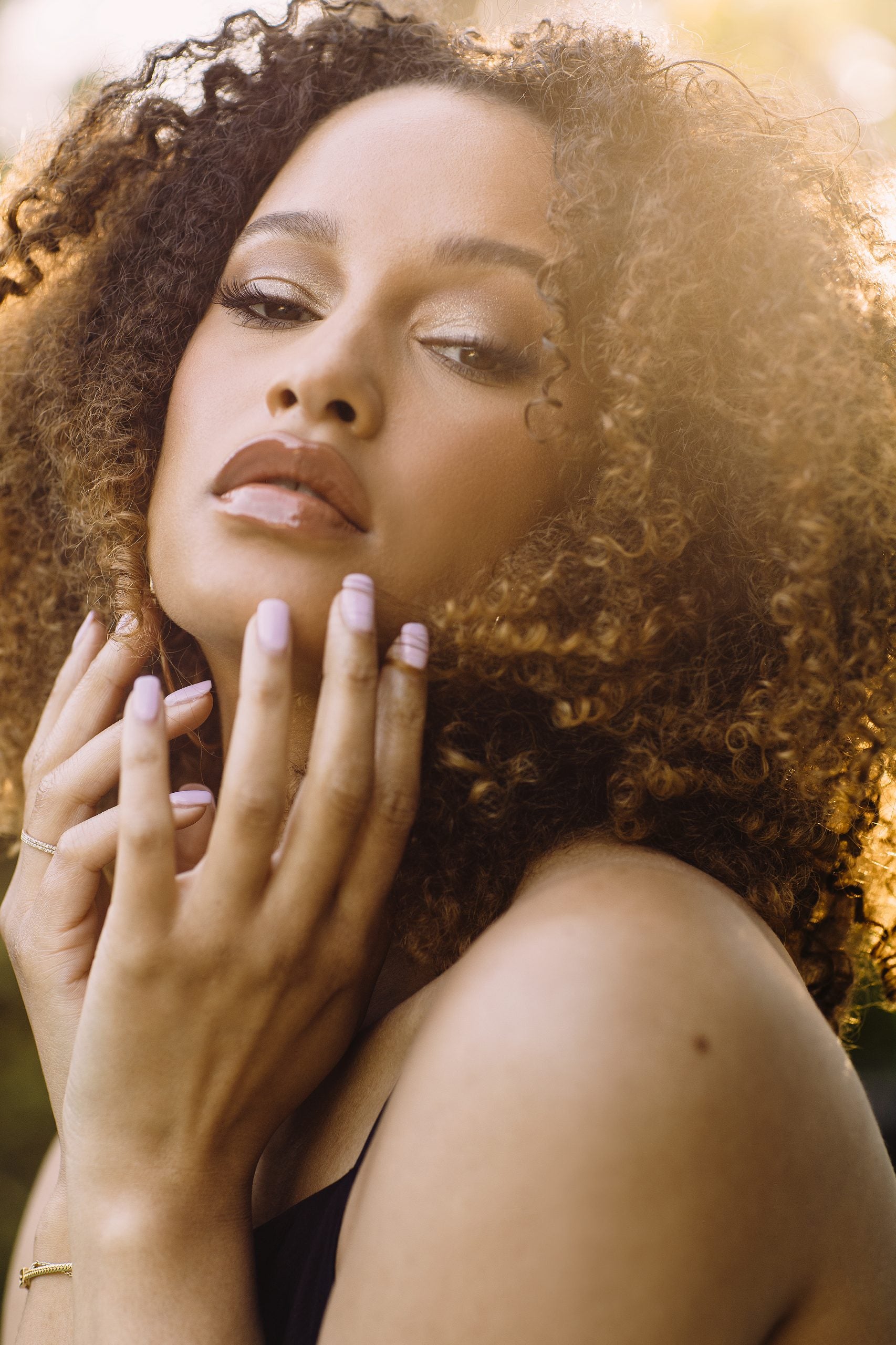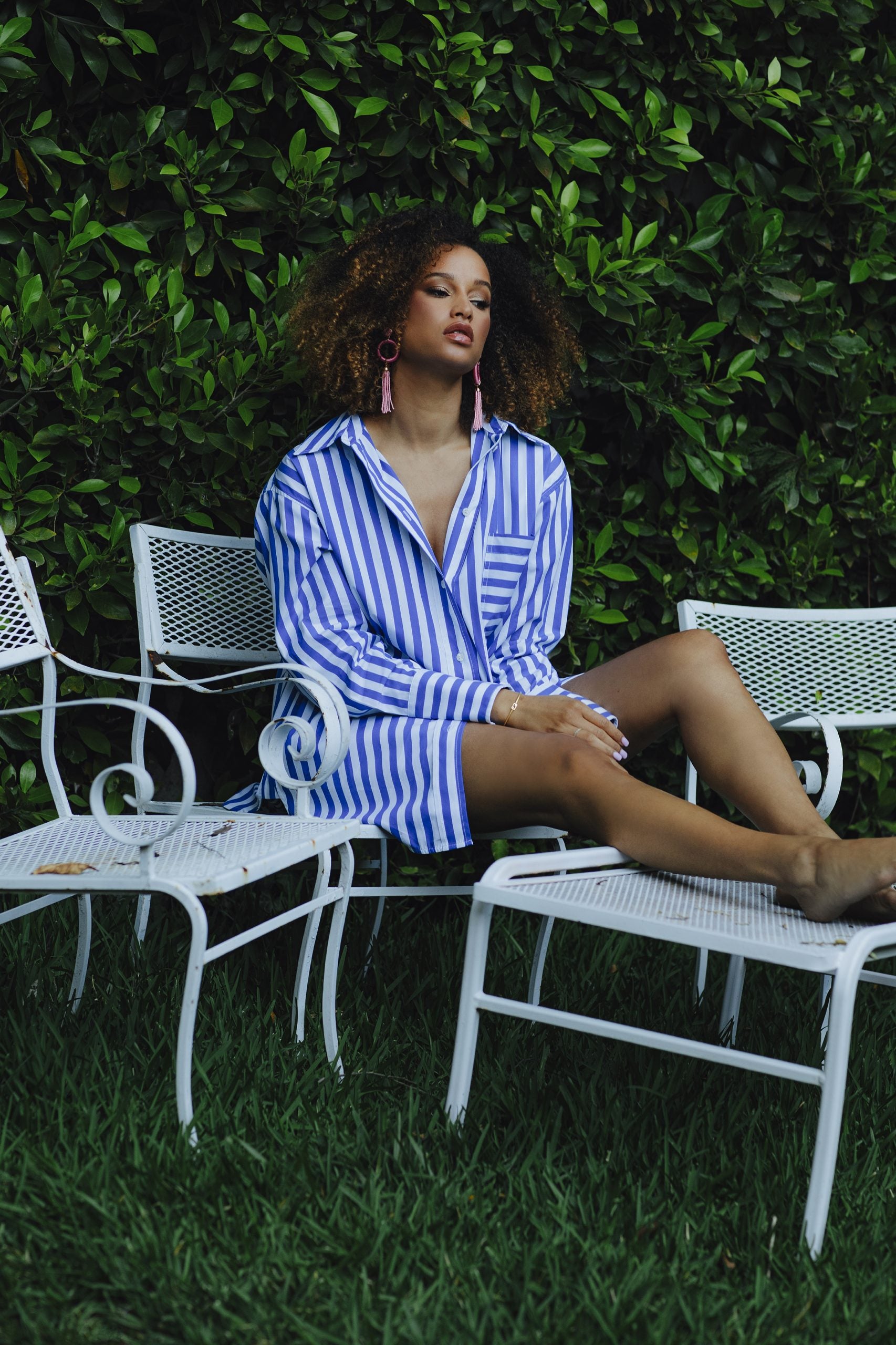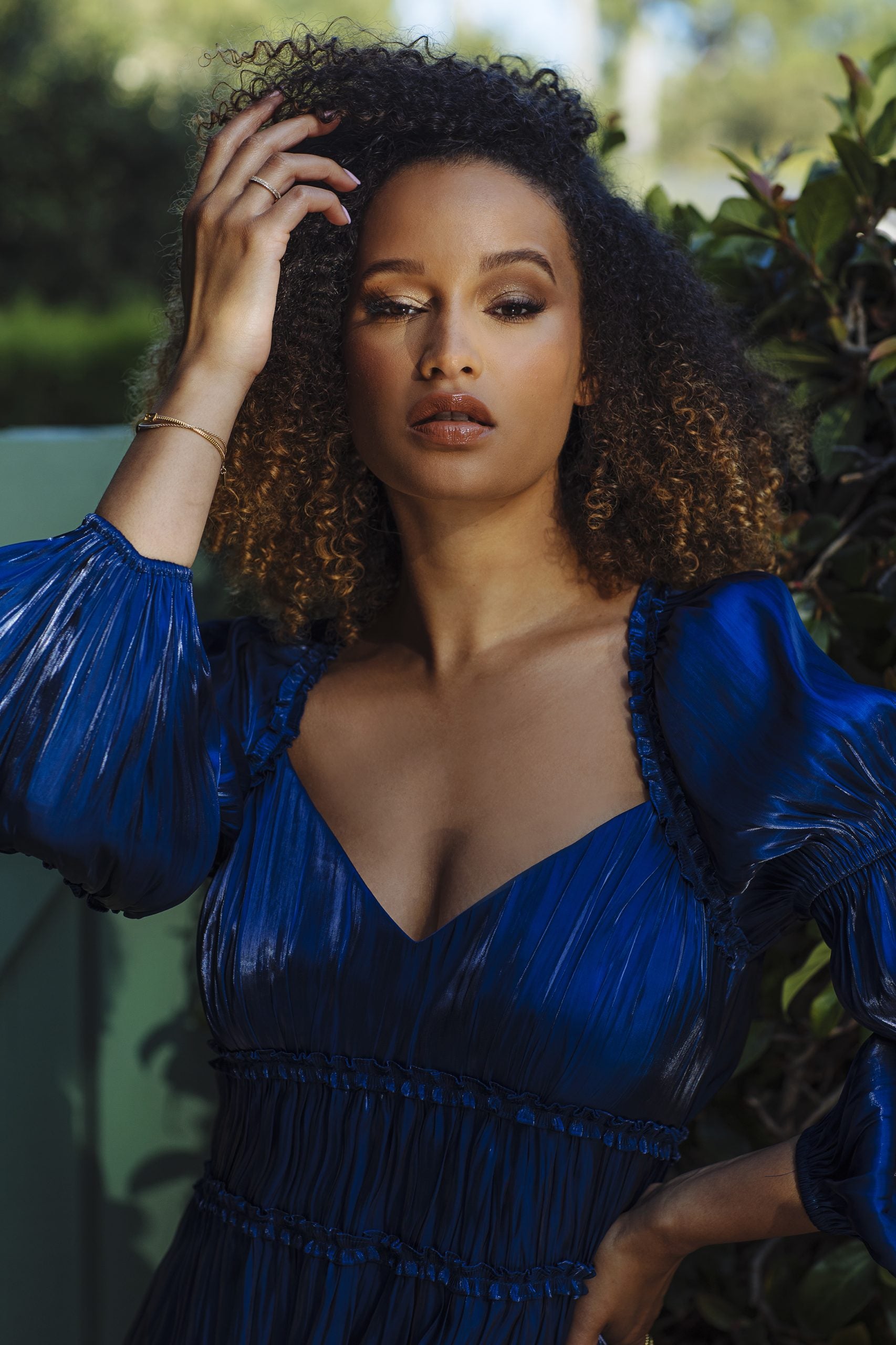
Fans have been anxiously awaiting the return of the much-beloved Starz series P-Valley. In the wake of our real-world pandemic, we’ve been away from the show’s dynamic characters for too long, including Mississippi, Uncle Clifford and Autumn Night.
On the heels of the drama’s record-breaking Season 2 return, spoke to Elarica Johnson, the British-born actress who plays Night about the new season, tackling the pandemic on screen and the prospect of getting boxed in to sexual roles. See what she had to say below.
What do you think it was it about P-Valley that captured so much of the public’s attention?
I think it was the fact that it was something people hadn’t really seen before. Among the cast we were talking about how many films we had seen about strip clubs, dancers, something with women in the forefront. [It made us wonder] how is this going to be accepted by the audience? Is this going to be something that does really, really well? Is it something people won’t understand?

And there’s the world of Chucalissa, Mississippi itself. It’s a place that no one had ever really seen before. If they had, it was because they were from the south and understood the language, the culture, the music and the whole entire vibe. For me, it was a place that I had never been or experienced. And that was so exciting! That’s why I was interested and thought a lot of other people would be. On top of that, the writing is fantastic. There were a huge amount of people that can relate to it. It’s a mixture of the two. We just gave a window into this world people hadn’t seen before.
Someone wrote that P-Valley is a lot like Player’s Club except that we see the story from the feminine gaze.
That’s what Katori [Hall] (creator of P-Valley) wanted. That’s why we have all of these female directors. And I think it’s about time. We’re always seeing women being oversexualized, from this man’s perspective for so many years now. What does it look like from a woman’s perspective? It’s still a strip club and still women who are dancing, who are nude. What it does is shows these women as more human in ways. And also, we see past the sexuality and nudity and see who they really are. They’re fantastic people. I’ve seen films with strip clubs and dancers before and you never know who they are. They’re just in the background.
How did you feel going into the second season? Did you feel any pressure given the show’s popularity?
Honestly, I had a lot of time to think about it. We took a moment to come out. It was a lot of excitement. I don’t think the pressure was there. The thing with season 1 was that, the expectation that we had. We had no idea. So when the show came out and did so well, we were like this is amazing! I looked at what we had. We had this great fan group of people who could not wait for this show to come out. So regardless of what happened during season two, it was going to be loved. I can be very sure of that because Katori is very consistent. The stories that she tells with these characters are so real and so easy for the audience to relate and understand. They’re waiting for that. I don’t think the show is about ‘Let’s wait and the explosive stuff.’ That’s a part of it. But I think people are so invested in the characters and where they’re going emotionally that we’ve got eyes on us. I’m so grateful for it. And I’m very excited for everybody to see what the show is now. There were no nerves, it was more excitement to get back, be with the cast and stepping back into the valley.
Can you speak about the decision to tackle COVID on the show? A lot of people don’t want COVID in their entertainment.
I know a lot of people don’t want to see the stress that they’ve been going through for the past two years. But again, Katori’s writing is very honest and very real. So it makes sense that characters are living the same reality we have been. You want to feel close to these people and their journey because a lot of people have suffered during this time. The characters are going through a different time like everybody else is. The Pynk is an establishment like all the other ones around us. And it has an issue being able to continue because people have to be close. The struggle for the dancers to continue working when they don’t know what’s going on. But I think what is great is we’re seeing these characters outside of The Pynk in their natural habitat.
Some of the characters we have in the show are dealing with a lot at home. And also, mental health. I haven’t had a conversation about mental health as much as I have during COVID. It took people a moment to sit down with their thoughts. Not being able to be with the people they loved, they were by themselves and had to speak about it. It’s been very tough. And so I’m so glad, we are discussing what this world looks like in this very scary space that everybody has been in.

The show is known for tackling issues of colorism. From your perspective, do you think your character Autumn Night receives privileges or special treatment because she’s light?
I mean this is the age old conversation: colorism. [These are] discussions I’ve had with my friends and throughout my life. Reading the first season’s script, I thought, ‘Wow, this is really a conversation here.’ And it is in that world. I’ve been able to speak to some of the dancers. It’s definitely something America speaks about. America speaks about race a lot more than the Brits do. It’s way more of a conversation here.
There are things that people tend to–I don’t know if it’s because of age-old history reason. I don’t know if it’s about which skin color is more liked, but Autumn has a little bit of that in this club. Mercedes is hoping she can dance for a certain person but everybody’s pointing at Autumn Night who can’t even dance. Everyone wants to spend their money on her.
There are also moments where the conversation is quite strong on that note. The things that are said by Mercedes and Uncle Clifford, ‘Autumn just lays there, looking light.’ I said to Katori, ‘Autumn doesn’t ask to dance for these people. She doesn’t ask for these privileges. So is there a way in this space, where people are condoning that, that that can be spoken about and discussed? To have that be a part of the conversation outside of just watching the show, I think that that is fantastic.
This season we see a lot more of that, with some of the other characters. Autumn finally puts those big shoes on and says, ‘Hey I don’t like when you say those things about me.’ It’s not something I’m doing. I think it’s great that we have a platform as Black women, Black people to discuss these things for the Black community and the world itself.
You’re friends with fellow British actress Nathalie Emmanuel. She said that after she did Game of Thrones, people were coming to her with projects that contained nudity she felt was gratuitous. I was wondering if that’s a concern for you.
I think in general, when you take on a certain role and people see you in that space, they go, ‘Oh! Well she does that. We want to put her in this because we know she does that.’ It’s just a general thing. You don’t want to get boxed in with any role. I’ve done that throughout my life where I’ve had to say no to so many things because people are so comfortable seeing me play a certain character. But if you want a career with lots of different roles and to do different things then it’s important to make those choices and not do the same thing all the time.

When it comes to nudity, a lot of the roles I’ve done and been for do have the nudity aspect of it. I have done sex scenes, I’ve danced nude. I don’t doubt that things will come that have the same level of nudity. I’m not worried about it because at the end of the day, it’s my choice and I know I have a lot more to give. But I love the job that I do because I get to tell stories about all kinds of people. I don’t particularly want to tell the same story over and over again. I’ve done it in such a special way with P-Valley, playing Autumn Night this is probably going to be my one and only role. Hopefully, moving forward there’s an array of other characters where I can put my clothes on a little bit.
What are you excited for audiences to see this second season?
I want them to see how honest we’re being with the pandemic stuff. I’m excited because so many people are going to relate. And yes, we’ve seen it on screen already. There have been movies. I know people have been watching it. But to me it’s different when people have had a relationship with these people. People had a relationship with Uncle Clifford, Autumn Night and Mississippi. That world just felt like it was a part of them. What does that place look like with a pandemic? What do these people do in order to still exist in this space, to live and conquer the issues they have already. How are they loving people? How are they holding their friendships?
Out of everything, it’s how the relationships have gone with these characters. Autumn Night/Uncle Clifford it’s a whole new dynamic. Maybe not the best one. But we like explosive stuff. I think people will enjoy how things will turn out between the two. Then we have Mississippi and the relationship with her daughter. I’m so invested in the characters here and the storytelling. I cannot wait for the fans to get stuck in.